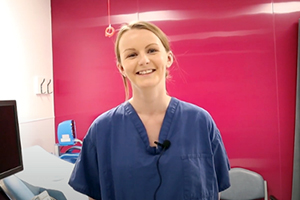Charlotte Mehegan talks about Cardiac Science
Charlotte is a Highly Specialised Cardiac Physiologist and Regional Healthcare Science Training Lead at West Suffolk NHS Foundation Trust.
- Programme
- Healthcare Science
- Role
- Healthcare Science
Why did you choose a career in healthcare science?
I chose this career as it gives me the opportunity to bring together my passion for cardiac physiology and diagnostics, with patient care. My role provides a forum for professional development, innovation and above all else the opportunity to improve a patient’s quality of life.
What does a typical day involve?
My current role within as a Highly Specialised Cardiac Physiologist involves the delivery of patient centred cardiac diagnostics and cardiac device therapy. My day-to-day role utilises the application of technology, research and clinical guidelines to provide therapeutic device care to patients with a variety of pathology. The aim of my role within cardiac rhythm management is to evaluate and optimise device therapy to improve a patient’s quality of life.
My regional training lead role allows me to inspire current and future healthcare scientists through education, mentoring and signposting to great resources. I particularly enjoy working with my colleagues to create and deliver ECG training to HCS students from a variety of specialisms. My personal passion in this role is to open doors for prospective healthcare scientists from sports science backgrounds.
What is your academic background?
My academic background includes BSc Sport and Exercise Science and MSc Clinical Exercise Physiology. My career in cardiac science started in 2017 when I joined West Suffolk NHS FT as a band 5 Trainee Cardiac Physiologist. Over the last five years I have completed in-house competencies, attended a variety of courses and conferences, and most recently obtained international accreditation as a Cardiac Device Specialist. At present I am in the process of obtaining STP Equivalence through the AHCS. My trust has supported me both practically and financially to achieve my career goals thus far.
How does your job impact on patient health?
Within cardiac science I interpret clinical data to support diagnosis, helping patients receive the most appropriate care. My role in the optimisation of therapeutic device therapy allows me to improve a patient’s quality of life, whether that’s improving their cardiac function or treating their life-threatening issues such as an irregular heartbeat.
What would you say to someone thinking about a career in healthcare science?
My advice to those considering a healthcare science role in the NHS is to choose a specialism you are passionate about, and to say ‘yes’ to every opportunity of experience and professional development that is offered to you along the way!
